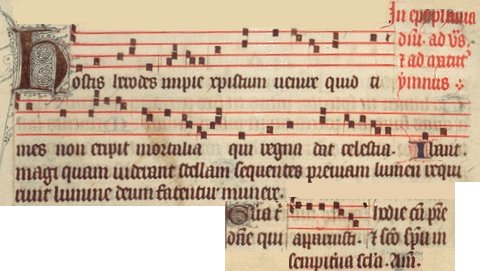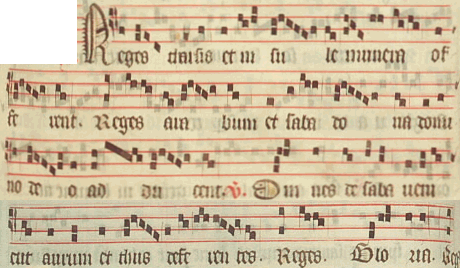Even Years: Odilo of Cluny, Sermon 9, on Pentecost (PL 142, 1015-1016)
| Natus est Christus ex incorrupta
Virgine, ut humana corrupta nativitas in spiritalem transferretur originem. Legalem
voluit suscipere circumcisionem, ut ejusdem legis se demonstraret auctorem, et
nos, exemplo ejus spiritalibus gaudiis circumcisi, id est coelestibus
disciplinis eruditi, ad fabricam coelestis aedificii inveniamur idonei.
| In order that our fallen human birth might become a new birth in the Spirit, Christ was born of a spotless virgin. He chose to be subject to the law of circumcision to make it clear that the law was of his own making and to enable us too to be circumcised after his example through the experience of spiritual joy. By this I mean that through our formation in the Christian life we might be found worthy of incorporation into God's heavenly building.
| | Deinde a magis adoratus, tres
significativas suscepit species munerum, ut qui erat pro nobis mortalis
effectus, Rex saeculorum crederetur et Dominus. Voluit etiam in templo
praesentari, turturem et columbam pro se voluit offerri, dans nobis exemplum ut,
cum ad altare accedimus, castitatis et innocentiae caeterarumque virtutum victimas
immolemus.
| After his circumcision Christ received the homage of the wise men, who brought him gifts of three different kinds. These gifts symbolized their belief that the child who had become man for our sake was the King and Lord of all ages. He also chose to be presented in the temple and to have offered on his behalf a turtledove and a pigeon. This he did to give us an example: when we come to the altar we must bring chastity, innocence and all other virtues as our sacrificial offerings.
| | Duodennis in templo matre
Virgine nesciente remansit, post paululum studio ferventi cursuque citato
requiritur, et, ut Lucas refert, in medio doctorum sedens, non docens, sed
discens et audiens invenitur. Interrogante autem matre, cur se ignorante
remansit, in domo Patris sui esse se respondit. Haec etenim puerilia gesta
catholicae fidei sunt firmitate subnixa. Cum vero Jesus a matre requiritur, procul
dubio verus homo cognoscitur. Dum esse se in domo Patris oportere testatur, a
cunctis fidelibus verus unicus Dei Filius creditur. In medio doctorum sedens, audiens
illos et interrogans, signat ut nullus nisi perfecta aetate praedicationis
officium assumere praesumat.
| At the age of twelve years Jesus remained behind in the temple without the knowledge of his virgin mother. An urgent, anxious search found him after a little while sitting among the doctors, not teaching them but listening to them and absorbing what they said. In answer to his mother's question as to why he had stayed there without telling her, he replied that he was in his Father's house. These were the actions of a young boy, yet they are supported by the certitude of Catholic belief. When we see the mother of Jesus searching for him, we have no doubt that he is fully human. When Jesus declares that it is fitting for him to be in his Father's house, all the faithful believe him to be the true and only Son of God. When they see him sitting among the doctors, listening and asking questions, they see in this a sign that only mature adults should aspire to the work of preaching.
| | Sciendum praeterea quod de infantia
Salvatoris non plus Ecclesiae pietas approbat quam quod divinus sermo
pronuntiat. Infirmitates tamen assumptae mortalitatis, sicut fides fidelium
credit, absque ullo contagio peccati percucurrit, sed Deus occultus in homine
semper impassibilis mansit, et licet Dei Filius nullam haberet mundandi vel
purificandi necessitudinem, certo tamen die determinato tempore, trigesimo
videlicet aetatis suae anno, illud singulare ac singulariter salutare mysterium
baptismatis suscepit, suscipiendo sanctificavit, sanctificando cunctis
fidelibus ut per illud sanctificarentur, ac si coeleste donativum contradidit.
| [We should realize that the piety of the Church approves about the infancy of the Savior no more than what Scripture says. The weaknesses of his adopted mortality, as the faith of the believers holds, contracts no contamination of sin, but the Divinity hidden in the man always remains impassible.] Although as Son of God he needed neither cleansing nor purifying, yet on a particular day at a determined time when he was thirty years old he underwent the rite of baptism, that unique mystery by which alone we receive salvation. By undergoing baptism he consecrated it, and by that consecration he bestowed as a heavenly gift on all believers the holiness which baptism confers.
| | Sed dum baptizandi
possibilitatem ministris Ecclesiae concessit, potestatem baptizandi quasi
quoddam insigne sibi vindicans reservavit, sicut divina vox B. Joanni homini magni
meriti nuntiavit, quando Christus ad illum gratia baptizandi venire non
distulit. Super quem videris, inquit, Spiritum descendentem et
manentem super eum, ipse est qui baptizat. Ipse etenim amicus Sponsi, fidelis
humilisque Praecursor, quo inter natos mulierum, teste Veritate, non surrexit
major; baptizans et baptismum praedicans sicut sacer evangelicus sermo
describit. Ait enim: Ego quidem vos baptizo in aqua, qui autem post me
venturus est, ipse vos baptizabit in Spiritu sancto et igni.
| But while he has granted the faculty of baptizing to the ministers of his Church, the power of baptizing he keeps in his own hands, as if claiming this as a special privilege of his own. This is what the divine voice announced to the great and holy John when, without hesitation, Christ came to him for baptism. The man on whom you see the Spirit come down and rest, said that voice, is the one who is going to baptize. John himself was the friend of the Bridegroom, the faithful and humble forerunner, and Truth in person has testified that none greater than he has arisen among the sons of women. Yet even as John baptized he preached another baptism. So it is written in the holy Gospel, where John is reported as saying: I baptize you with water, but another is to follow me who will baptize you with the Holy Spirit and with fire.
|
Odd Years: St. Cyril of Alexandria, On the Gospel of John, Bk.5, ch.2
| Ἐπειδὴ
δὲ ὁ πάντων
γενεσιουργὸς
ἀνακεφαλαιώσασθαι
τὰ πάντα ἐν τῷ
Χριστῷ καλῶς γε
σφόδρα ποιῶν
ἐβουλεύσατο,
καὶ ἀνακομίσαι
πάλιν εἰς τὸ
ἀρχαῖον
ἠθέλησε τὴν τοῦ
ἀνθρώπου
φύσιν,
ἐπαγγέλλεται
μετὰ τῶν ἄλλων,
ἐπιδώσειν
αὖθις αὐτῇ καὶ
τὸ Πνεῦμα τὸ
ἅγιον· οὐ γὰρ ἦν
ἑτέρως εἰς
ἀκλόνητον
στάσιν τῶν
ἀγαθῶν
ἀναδραμεῖν.
| When the Maker of the universe designed, in a beautiful arrangement, to gather up all things in Christ and to restore again the nature of man to its pristine state, he promised along with the other gifts to give it also the Holy Spirit abundantly, because in no other way could it be reinstated in a peaceful and stable possession of good things.
| | ὁρίζει
τοιγαροῦν τῆς
ἐφ᾽ ἠμᾶς τοῦ
Πνεύματος καθόδου
τὸν καιρὸν τὸν
τῆς ἐπιδημίας
τοῦ Χριστοῦ, καὶ
ἐπαγγέλλεται
λέγων· Ἐν ταῖς
ἡμέραις
ἐκείναις, ταῖς
τοῦ Σωτῆρος
ἡμῶν δηλαδὴ,
ἐκχέω ἀπὸ τοῦ Πνεύματός
μου, δελαδὴ, ἐπὶ
πᾶσαν σάρκα.
| He therefore defines the time when the Spirit will descend on us, that is the coming of Christ, and promises saying: In those days (that is, of the Saviour), I will pour out my Spirit upon all flesh.
| | Ἐπειδὴ
δὲ τῆς
φιλοτιμίας ὁ
χρόνος
παρεκόμισεν εἰς
μέσον μετὰ
σαρκὸς ἐπὶ τῆς
γῆς τὸν
Μονογενῆ,
τοῦτ᾽ ἒστιν ἄνθρωπον
ἐκ γυναικὸς
γεγονότα κατὰ
τὴν ἁγίαν Γραφὴν,
ἐδίδου τὸ
Πνεῦμα πάλιν ὁ
Θεὸς καὶ Πατὴρ,
ἐδέχετο δὲ
πρῶτος ὡς
ἀπαρχὴ τῆς
ἀνανεουμένης
φύσεως τὸ
Πνεῦμα ὁ
Χριστός. Ἐμαρτύρησε
γὰρ Ἰωάννης
λέγων, ὅτι
Τεθέαμαι τὸ
Πνεῦμα
καταβαῖνον ἐξ
οὐρανοῦ, καὶ
ἔμεινεν ἐπ᾽
αὐτόν
| When the time of this munificence brought the Only-begotten upon earth with flesh - that is, made man of a woman according to the holy Scripture - the God and Father began to give the Spirit again, and Christ received the Spirit first as First-fruits of the renewed nature. John bore witness to this, saying: I saw the Spirit descend from heaven, and it remained on him.
| | Ἐνδέχετο
δὲ πῶς;
Ἐπεξεργεστέον
γὰρ ἀναγκαίως
τὸ εἰρημένον.
Ἆρ᾽ ὡς οὐκ
ἔχων αὐτὸ
τοῦτο φαμεν; μὴ
γένοιτο. Ἴδιον
γὰρ τοῦ Υἱοῦ
τὸ Πνεύμα ἐστι,
καὶ οὐκ ἔξωθεν,
ὥσπερ ἡμῖν
ἐπεισκρίνεται
παρὰ Θεοῦ
χορηγούμενον,
ἀλλ᾽ ἐνυπάρχει
φυσικῶς ἀυτῳ
καθάπερ καὶ τῷ
πατρὶ, καὶ δι᾽ αὐτοῦ
πρόεισι τοῖς
ἁγίοις κατὰ τὸ
ἑκάστῳ πρέπον διανεμηθὲν
παρὰ τοῦ
Πατρός.
| [How did he receive him? The statement needs study. Do we say he received what he did not have? By no means. For the Spirit belongs to the Son, and does not come from outside, as we hold that he comes upon us from God, but the Spirit dwells naturally in him, just as in the Father, and from him he comes forth to the saints, according to the proper measure determined by the Father.]
| | Ἐιληφέναι
δὲ λέγεται, καθὸ
γέγονεν ἄνθρωπος,
καὶ ἦν ἀνθρώπῳ
πρέπον τὸ λαβεῖν,
καὶ ὥσπερ Υἱὸς ὑπάρχων
τοῦ Θεοῦ καὶ
Πατρὸς, καὶ ἐκ τῆς
οὐσίας αὐτοῦ
γεγεννημένος,
καὶ πρὸ τῆς ἐνανθρωπήσεως,
μᾶλλον δὲ καὶ
πρὸ πάντων αἰώνων,
κατ᾽ οὐδὲν ὅλως
ἀσχάλλει λέγοντος
τοῦ Θεοῦ καὶ
Πατρὸς πρὸς αὐτὸν
ὅτε γέγονεν ἄνθρωπος·
Υἱός μου εἶ σὺκ
σήμερον γεγέννηκά
σε.
| Christ is said to have received the Spirit, because he became man, and it was fitting for man to receive. Although he is the Son of the God and Father, and begotten of his substance even before the incarnation- or rather, before all ages - he does not take it amiss to hear the God and Father address him after he became man: You are my Son; today I have begotten you.
| | Τὸν
γὰρ πρὸ αἰώνων ὄντα
Θεὸν, ἐξ αὐτοῦ
γεγεννημένον,
σήμερον γεγεννῆσθαί
φησιν· ἵν᾽ ἡμᾶς
ἐν αὐτῷ καταδέξηται
πρὸς υἱοθεσίαν,
ὅλη γὰρ ἐνηνθρώπησε
Χριστῷ, καθόπερ
ἦν ἄνθρωπος· οὕτω
καὶ τὸ ἴδιον ἔχων
Πνεῦμα, διδόναι
πάλιν αὐτὸ λέγεται
τῷ Υἱῷ, ἵνα ἡμεῖς
ἐν αὐτῷ τὸ Πνεῦμα
κερδάνωμεν. Ταύτης
τοιγαροῦν τῆς
αἰτίας ἕνεκα
σπέρματος Ἀβραὰμ
ἐπιλαμβάνεται,
κατὰ τὸ
γεγραμμένον, ὡμοιώθη
δὲ κατὰ πάντα
τοῦς ἀδελφοῖς.
| For he says that he has today begotten him, who before all ages was God begotten of him, so that in him he may receive us into sonship; for the whole human nature is found in Christ, because he is man. Since the Father has his own Spirit, he is said to give it again to the Son, so that in him we may gain the Spirit. For this reason therefore taking the seed of Abraham, as it is written, he was made like to his brethren in every respect.
| | Δέχεται
τοίνυν οὐχ ἑαυτῷ
τὸ Πνεῦμα τὸ ἅγιον
ὁ Μονογενής· αὐτοῦ
γάρ ἐστι, καὶ ἐν
αὐτῷ, καὶ δι᾽ αὐτοῦ
τὸ Πνεῦμα, καθάπερ
ἤδη προείπομεν·
ἀλλ᾽ ἐπείπερ ἄνθρωπος
γεγονὼς, ὅλην εἶχεν
ἐν ἑαυτῷ τὴν φύσιν,
ἵνα πᾶσαν ἐπανορθώσῃ
μετασκευάσας εἰς
τὸ ἀρχαῖον. Πρὸς
δέ γε τοῖς εἰρημένοις
κακεῖνο
περισκεπτέον. Ὁψόμεθα
γὰρ διὰ λογισμῶν
ἰόντες σοφῶν,
καὶ τοῖς ἀπὸ τὴς
θείας Γραφῆς
βεβαιούμενοι λόγοις,
οὐχ ἑαυτῷ λαβόντα
τὸ Πνεῦμα
Χριστὸν, ἡμῖν δἒ
μᾶλλον ἐν ἑαυτῷ·
πάντα γὰρ δι᾽ αὐτοῦ
καὶ εἰς ἡμᾶς τρέχει
τὰ ἀγαθά.
| The Only-begotten therefore receives the Holy Spirit not for himself; for the Spirit is his, and is given in him and through him, as we said before; but because he was man he had the whole nature in himself, that he might renew it all and restore its integrity.
Besides what has been said, we must consider this too. For we shall see, if we use right reasoning and the testimonies of Scripture, that Christ did not receive the Spirit for himself, but rather for us in himself: for all good things flow through him also into us.
|
| |




